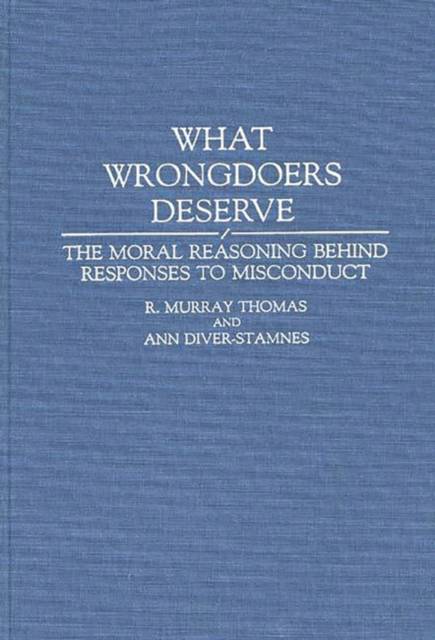
- Afhalen na 1 uur in een winkel met voorraad
- Gratis thuislevering in België vanaf € 30
- Ruim aanbod met 7 miljoen producten
- Afhalen na 1 uur in een winkel met voorraad
- Gratis thuislevering in België vanaf € 30
- Ruim aanbod met 7 miljoen producten
Zoeken
What Wrongdoers Deserve
The Moral Reasoning Behind Responses to Misconduct
R Murray Thomas, Ann Diver-Stamnes
€ 127,45
+ 254 punten
Omschrijving
This study analyzes the reasoning process through which individuals determine what consequences are appropriate for those who do wrong. The authors presented six cases of wrongdoing to a large number of teenagers and young adults. This sample was asked what consequences would be appropriate for the wrongdoers and why those proposed consequences would be appropriate. On the basis of the data obtained from the participants, the authors constructed a taxonomy to use in categorizing features of moral reasoning. The authors then applied the taxonomy to compare group and individual modes of moral decision making. The study is significant in its reliance on original data and on its analysis of the thought processes involved in moral decision making.
Specificaties
Betrokkenen
- Auteur(s):
- Uitgeverij:
Inhoud
- Aantal bladzijden:
- 192
- Taal:
- Engels
- Reeks:
Eigenschappen
- Productcode (EAN):
- 9780313286308
- Verschijningsdatum:
- 30/07/1993
- Uitvoering:
- Hardcover
- Formaat:
- Genaaid
- Afmetingen:
- 156 mm x 234 mm
- Gewicht:
- 439 g

Alleen bij Standaard Boekhandel
+ 254 punten op je klantenkaart van Standaard Boekhandel
Beoordelingen
We publiceren alleen reviews die voldoen aan de voorwaarden voor reviews. Bekijk onze voorwaarden voor reviews.











